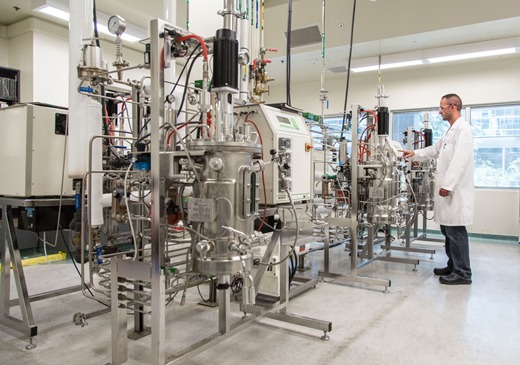For over 70 years, the Saskatchewan Research Council (SRC) has contributed to the province’s agriculture and biotechnology sectors through a variety of research projects, which ranged from determining practical solutions for traditional agriculture, to developing new laboratory services for industry and conducting field trials to evaluate emerging technologies.
Throughout the first four decades, SRC provided solutions for traditional agriculture, such as mapping groundwater sources, establishing farm energy conservation practices and selecting alternative crops for stronger drought and salinity resistance. In the late 1980s, SRC expanded its work with the addition of biotechnology research projects, such as establishing DNA-based testing services, researching fermentation processes and developing technologies to create and evaluate biofuels for agricultural purposes. To demonstrate the significant milestones that have been achieved through this research specifically, a brief overview of SRC’s work of the last 30 years is provided.
DNA-based testing
In 1987, SRC acquired and moved the Bovine Blood Typing Laboratory from the federal government in Ottawa to Saskatoon, Saskatchewan and began offering commercial DNA parentage testing for cattle and other livestock. Research extended to offer testing of additional DNA-based traits which led to the launch of a national DNA sample bank in 1992.
A related lab was launched in 1998 to provide DNA-based services involving plants, which included testing for the presence and identity of genetically modified organisms (GMOs) and testing for midge resistant wheat varieties in support of the Canadian midge refuge strategy. This research has enhanced the durability of midge resistance and limited crop failure due to midge fly infestations.
Fermentation research and development
Fermentation projects at SRC began in the early 1980s, and within a decade there was significant commercial interest in Saskatchewan to produce ethanol for use as a fuel through the microbial fermentation of sugars in plants, like starch and cellulose. SRC also worked with government and regional businesses in evaluating, developing and supporting ethanol fuel manufacturing pilot plants based on crops like wheat and alternative cellulose materials like straw.
In the late 1990s, SRC’s fermentation pilot plant and associated laboratories enabled practical work on potential new products such as ethanol, crop inoculants, herbicides, pesticides, fertilizer and animal vaccines. Throughout the 2000s, these projects addressed diverse industry problems and provided practical solutions, which include:
- Completing the first commercial run of the animal vaccine Coliprotec, developed by Prevtec Microbia Inc., an animal health company based in Quebec. This was the first live animal vaccine to be developed, validated and produced in Canada.
- Developing genetic tests for the rapid identification of Canadian wheat and other grain varieties to support an export-oriented grain industry.
- Supporting the Saskatchewan Beekeepers Association to develop mite-resistant honey bees.
- Helping the Canadian Wildlife Service manage the sustainability of elk herds.
- Assisting the Canadian Forestry Service with genetic selection to develop fast-growing trees that could provide a biomass feedstock to produce energy on a short-rotation basis.
The current landscape and a look to the future
To serve broader markets, SRC and the National Research Council of Canada (NRC) partnered in 2015 to bring the capabilities of both organizations together to work on biomanufacturing processes and products for various industries. The jointly managed fermentation facility enables clients to optimize production of agricultural products such as agricultural inoculants, biopesticides and biostimulants and to scale-up production of bio-based chemicals and food/feed ingredients. SRC is also supporting the crop breeding industry by providing genomic analysis and varietal identification services.
SRC’s research in agriculture and biotechnology evolved based on industry demand. Since 1947, SRC has provided solutions to Saskatchewan’s agriculture and biotechnology sectors, such as demonstrating best-practices in the field, developing DNA-based tests, establishing biomanufacturing processes and evaluating biofuels for producers in the industry. Going forward, SRC continues to enable and accelerate biotechnology innovation with a broad portfolio of genomic, microbiology and biomanufacturing services, as well as DNA testing services, to support a sustainable agriculture industry in Canada.
This article first appeared in Biotechnology Focus magazine.
Photo: SRC Biotechnology Laboratories enable clients to optimize production of agricultural inputs and provide genomic analysis and varietal identification services to the crop breeding industry.
